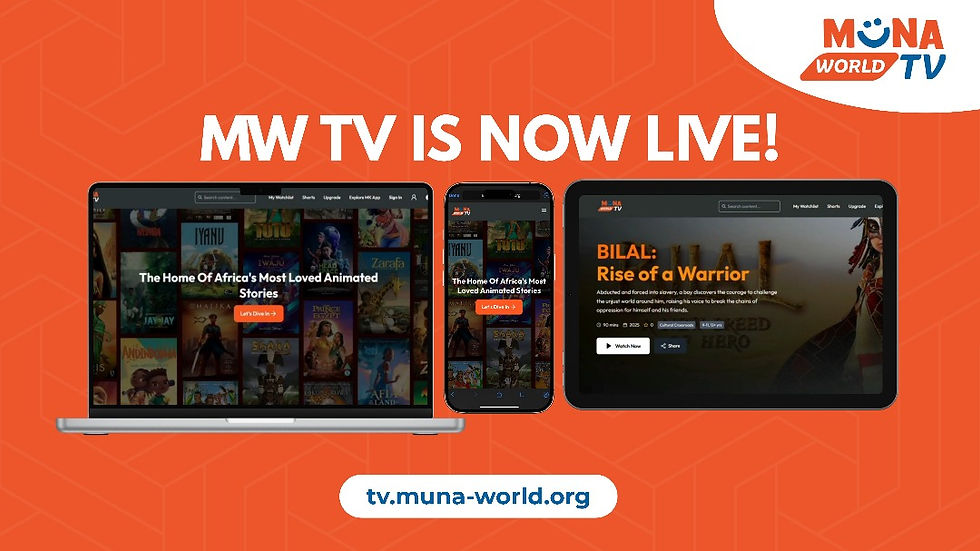“ Children’s literature is increasingly free from taboos – Andrea LIAO, Founder of Book the Future”
- Muna Kalati

- Feb 16, 2022
- 4 min read
Updated: Feb 12, 2025
"Unhappy families move me the most". Thoughts of Andrea LIAO, President & Founder of Book the Future“. All happy families are alike; each unhappy family is unhappy in its own way" (Tolstoy).
Muna Kalati :What books did you like to read as a child? Do you think they are also interesting and understandable for modern children? *
I liked reading historical fiction as a child (Little House by Laura Ingalls Wilder was my favorite).
I think they are not as interesting and understandable for modern children (such as my younger brother) as they were for me, but it is the genre that inspired me to write my own stories.
MK: What were the first children's books you read? Were they African? Any childhood authors you remember? What did these reading practices teach you as a child? *
One of my favorite childhood books is Ninth Ward by Jewell Parker Rhodes. The protagonist is a young African American girl, and the book takes place in New Orleans in the aftermath of Hurricane Katrina.
MK: Could you give us an overview of your career? Why did you become interested in the world of children's books? Is it a choice or a stroke of fate?
When I was young, my grandma would tell me stories as she tucked me into bed at night. One evening, I asked her to read from one of my cousin’s picture books. After a moment of hesitation, she shook her head and told me gently, “Grandma does not know how to read.” I was bewildered. How could someone who knew so many stories be unable to read? My grandma explained that she had grown up during the Great Leap Forward: whereas I have access to an education system that emphasizes literacy, she had none at all. Instead, her tales sprang from oral traditions and personal experiences rather than pages and ink. As we spent more time together, I recognized the impact of illiteracy on all facets of daily life. From grocery shopping to riding the metro, I witnessed my grandma’s struggles and came to understand that illiteracy puts her very much at the mercy of her surrounding environment. Upon returning to live with my parents, I spent the rest of my childhood between bookshelves, seeking comfort in books the same way I had through my grandma’s tales. She, who has never read a book in her life, is the reason I love literature. As a youth literacy advocate, I hope to bring a similar appreciation to as many children as possible.
MK: What books are on your nightstand? What’s the last great book you read?
I recently read Our Violent Ends by Chloe Gong.
MK: What, in your opinion, is the main task of children's literature? Should it entertain, teach, educate, enlighten, create role models, liberate…
With access to reading resources comes agency: books educate, equip, and embolden. Literacy is the lifeblood of learning.
MK: How many children's books have you published to date? Could you name them? Would you like Muna Kalati to make some analysis on these books?
I have only published poetry and short stories. I am writing a young adult novel.
MK: Describe your ideal reading experience (when, where, what, how).
I like reading indoors on a rainy day.
MK: Have you ever gotten in trouble for reading a book?
Yes, I was banned from the library for a period of time in middle school.
MK: What book should everybody read before the age of 21?
Educated by Tara Westover
Recently, children's literature has become increasingly free from various prohibitions and taboos. The authors are not afraid of complex topics such as death, aggression, bullying, depression, feminism, racial problems… But do children need it? And where to find the balance between a happy childhood full of miracles and adventures, and the real world full of adult problems?
MK: Which writers — novelists, playwrights, critics, journalists, poets — working today do you admire most?
Leigh Bardugo
MK: In Africa, children's literature is located on the periphery and seen as a marginal genre compared to classical literature. What do you think of that?
I think that is unfortunate, as children's books are foundational.
MK: What is your vision for the future of children's literature in your country?Has a book ever brought you closer to another person, or come between you? *
I've made a lot of friends through favorite young adult books; Chain of Iron by Cassandra Clare was something I read with a friend this spring.
MK: What moves you most in a work of literature?
“All happy families are alike; each unhappy family is unhappy in its own way" (Tolstoy). Unhappy families move me the most.
MK: You’re organizing a literary dinner party. Which three writers, dead or alive, would you invite? *
The Brontë Sisters
MK: Which subjects do you wish more authors would write about?
Generational trauma
MK: Few books get into the list of world classics. Which of the modern authors who write for children can become a classic? (It doesn't matter what language he writes in or what country he lives in). *
Harry Potter will definitely turn into a classic!
You can read Andrea Liao’s article here: https://stanforddaily.com/2021/10/13/empathy-perspective-and-hope-memoirist-tara-westover-reflects-on-the-value-of-a-college-education/




Comments